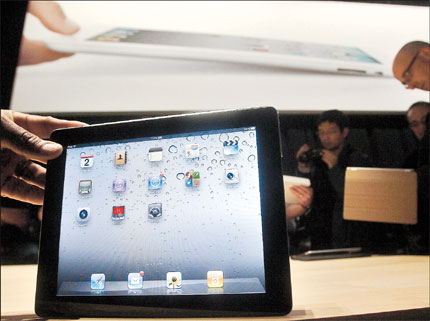Original iPad attractive on price fall
|
|
|
The iPad 2 is shown at the Yerba Buena Center for the Arts Theater in San Francisco after an Apple event on March 2. |
Many people in China are now wondering whether to wait and buy the new iPad 2 that went on sale in the United States last week.
Maybe it's a better time to take another look at the original iPad, given its recent price drop.
The original iPad at its new price of 2,888 yuan (US$437) is definitely a nuclear weapon to Apple's rivals striving to enter the booming tablet computer market.
To consumers, it's really good news because it means all tablet devices will become more accessible.
Therefore, it's not necessary for Chinese consumers to wait for iPad 2 to come to China, whenever that is. If you really want a pad device, just buy the original iPad now - if you can get your hands on one.
The device has been sold out in Apple's retail stores in Shanghai and Beijing since the announcement of the price drop.
Apple released iPad 2 on March 2 in San Francisco. It has a faster processor than its predecessor and it comes with front and rear cameras for taking photos and video chatting.
Also last week, Apple announced it would cut prices of the original iPad by 27 percent in China. The 16-gigabyte Wi-Fi iPad now costs 2,888 yuan, down from 3,988 yuan. Apple also trimmed prices for the 32GB Wi-Fi iPad to 3,688 yuan from 4,788 yuan, and for the 64-gigabyte version to 4,488 yuan from 5,588 yuan.
'Nuclear weapon'
In Apple's history, there has not been a price drop so quickly following a product update.
For example, the iPhone 3GS price dropped in December, three months after the debut of iPhone 4 in China.
In the electronics industry, it often takes time for companies to reduce prices on older products because distribution channels need time to clear inventories.
It's the reason why I called the price drop a "nuclear weapon": It is both a surprise and threatens to damage rivals greatly.
"In such a fast moving market, Apple is forced to release new versions of its hardware to stay ahead," said Adam Leach, an analyst at Ovum.
The new features of iPad 2 are exciting, to be sure, but price still reigns supreme in the domestic market.
Apple's rivals, such as Samsung, Motorola, BlackBerry and China's Lenovo and Hanwang, have announced or released tablet devices that aim to replicate iPad's success.
In the fourth quarter of 2010, sales of Apple mobile computers, including iPad and Mac laptop, reached 10.2 million units. For the first time its sales beat the 9.3 million units sold by the world's biggest PC maker, Hewlett-Packard, according to US-based research firm, DisplaySearch.
Apple has sold 15 million iPads in the market, occupying 90 percent of the tablet computer market, according to Ovum.
I think iPad, with its lower price tag, is now the undisputed king of the market.
In the Chinese shanzhai, or pirated, market in Shenzhen, even a copycat 10-inch pad device costs more than 2,000 yuan, which makes it difficult to compete with Apple, considering the iPad's user experience, high-profile brand and the huge volume of its applications. Other branded models are more expensive.
Samsung's Galaxy Tab, with a 7-inch screen which runs on Google's Android system, costs 5,488 yuan in its online store, almost double the price of the 10-inch iPad.
Motorola's Xoom, also operating on the Android system, costs US$799 - 80 percent more expensive than the iPad.
"Apple's aggressive pricing strategy is a huge threat to all players in the industry," said Wang Bangjiang, vice president of China's e-book reader Hanwang.
Hanwang's Hanvon-branded e-book reader also sells above 2,000 yuan, closer to iPad's new price but it comes without game and video playing functions.
After the iPad price-reduction announcement, I have heard industry officials from Sony and Samsung, who declined to be identified, saying it's going to be "tough" to expand their business, especially in tablet computers and small-sized PCs like the 10-inch netbook or 12-inch laptop.
China's biggest PC vendor Lenovo, which plans to debut its first tablet product LePad in China soon, is also said to be considering a "slight drop in the price" to compete with the cheaper iPad.
 0
0 







